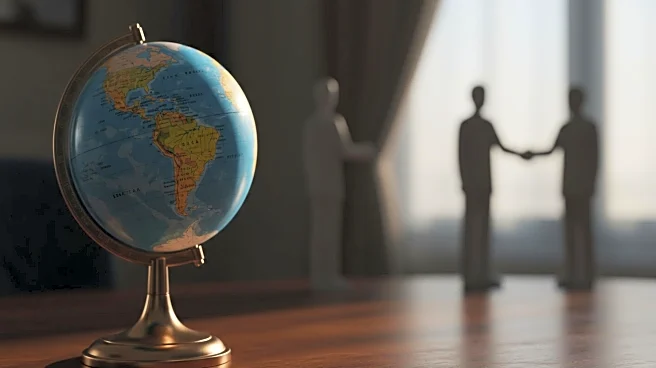What's Happening?
President Donald Trump met with Ukrainian President Volodymyr Zelenskyy and a coalition of European leaders at the White House on August 18, following his summit with Russian President Vladimir Putin in Alaska. The meeting aimed to bolster Zelenskyy's position as Trump continues to advocate for a peace deal to end the ongoing war between Ukraine and Russia, which has lasted over three years. The European leaders present included UK Prime Minister Keir Starmer, Italian Prime Minister Giorgia Meloni, French President Emmanuel Macron, German Chancellor Friedrich Merz, Finnish President Alexander Stubb, European Commission President Ursula von der Leyen, and NATO Secretary-General Mark Rutte. These leaders have been longstanding supporters of Ukraine, providing significant military and financial aid since Russia's invasion in February 2022.
Why It's Important?
The meeting underscores the international effort to resolve the conflict in Ukraine, which has significant implications for global security and geopolitical stability. The European leaders' presence highlights their commitment to supporting Ukraine and ensuring its territorial integrity. The discussions are crucial as they may influence the direction of peace negotiations and the potential involvement of NATO, which remains a contentious issue between Ukraine and Russia. The outcome of these talks could impact the future of U.S.-Russia relations and the broader international response to Russian aggression.
What's Next?
The next steps involve continued diplomatic efforts to reach a peace agreement that satisfies all parties involved. European leaders have pledged to provide 'ironclad' security guarantees for Ukraine, which will be central to any negotiations. The international community will closely monitor the situation, as any agreement could reshape alliances and influence future geopolitical dynamics. Stakeholders, including NATO and EU member states, will likely play a significant role in facilitating and supporting the peace process.
Beyond the Headlines
The meeting also highlights the complex interplay between international diplomacy and domestic politics. President Trump's approach to the Ukraine conflict may affect his administration's foreign policy legacy and influence his standing with European allies. Additionally, the involvement of NATO and the EU in the peace process could lead to shifts in their strategic priorities and defense policies, particularly concerning Russia's role in global affairs.










